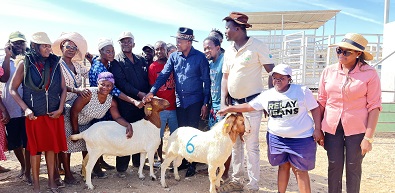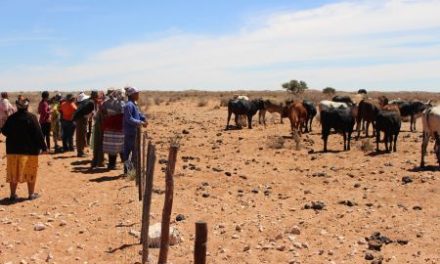
Agri Union applies for funding
The Namibia Agricultural Union (NAU) is applying for funds from the European Union to finance the implementation of the a rangeland strategy. According to the NAU the period 2012-2014 has affected farmers to the extreme due to the drought which hit the country and was listed as the worst in 30 years.
The European Union is currently supporting the Rangeland Forum over a period of two years with the amount of EUR 20,000 as it provides an excellent opportunity for the 10th EDF Climate Change Adaptation actions by bringing together farmers, decision makers and donors.
“The gravity of the drought was caused by the width over which it had spread, there was little relief for our members as well as all the other farmers in Namibia.,” NAU said.
The Environmental Defence Fund (EDF), launched by the European Union called for proposals earlier in 2014 along the theme: Climate Change adaptation and mitigation with EUR 6,675,000 allocated for the 10th edition of the fund.
Actions and future plans some of which will be supported by the European Commission will support efforts that mitigate and prevent or reduce the impacts of climate change while also presented and discussed under the 10th EDF while also focusing on rangeland management.
Agricultural production in Namibia is mostly rain-fed and therefore vulnerable to climate change. Namibia is already facing short growing seasons for crops and the decrease in the number of consecutive wet days will shorten the growing season even more.
The livestock sector is expected to be affected by changes in the quality and quantity of vegetation and availability of fodder while further being affected by heat stress of the animals and occurrence of climate related diseases.
The phenomenon of bush encroachment, which has taken root in Namibia due to poor rangeland management practises has already had a significant impact on the productivity of Namibia’s rangelands.
“On privately owned land the number of cattle over the past 50 years decreased by half largely as a result of the loss of perennial grass and bush encroachment,” the union said in their weekly newsletter.
Again increased carbon dioxide levels in the atmosphere continue to accelerate climate change and are also expected to increase bush encroachment over time. Furthermore, the increased bush and reduced perennial grass are significantly reducing groundwater resources.
The purposes of the Rangeland Forum is to facilitate the bringing together of farmers, decision makers, support agencies and donors in the rangeland sector to expose them to key note presentations and enable discussions on key topics.
Facilitate participants of the Forum to visit farms that enable key messages to be experienced and discussed, providing the opportunity for EDF 10 Climate Change Adaption and ‘Southern African Science Service Center for Climate Change and Adaptive Land Use’ (SASSCAL) programmes to present their projects.
The influence of climate change on the Namibian agriculture calls for improved land use practices, like improved rangeland management, minimum tillage and conservation agriculture, and water harvesting.











































